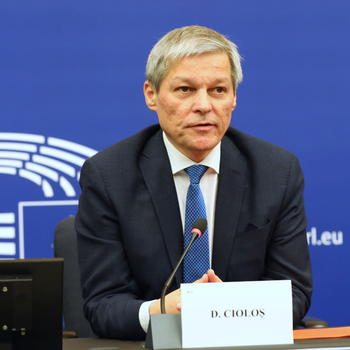COVID-19: ‘‘What we do now will determine how we live in the future.’ warns President of Renew Europe, Dacian Ciolos

Speaking in the European Parliament’s plenary debate on the COVID-19 pandemic and its consequences, the President of Renew Europe, Dacian Ciolos, today issued a rallying call for EU countries and the institutions to go beyond the soundbite of doing ‘whatever it takes’ to save lives, protect jobs and liberal democracy in Europe. Now is the time to put those words into action, in order to secure a brighter future, in keeping with EU values of democracy and fundamental rights.
Dacian Ciolos, President of Renew Europe, said:
‘I wish to pay homage to our healthcare professionals, exhausted from weeks of battling Covid-19, all of Europe bows its heads to you - and this battle is far from over. Praise is due also to those who show the power of democracy in the face of difficult decisions affecting the lives of millions of our citizens.’
‘The Europe that we need most right now is a Europe of solidarity, collective creativity and generosity of spirit. We are living in a period of immense difficulty. It is a test for each one of us. This challenge and the choices it forces us to make, will permanently alter our way of life. Through the lessons we are learning at this moment, we are creating a new world that will follow.’
‘Firstly: we have the responsibility to learn lessons from this health crisis. We will not be able to do things better in the future if we don’t admit now that the attitude of certain Member States to withdrawn into themselves and the lack of action of the Commission has left a bitter taste in the mouths of many European citizens. This must be our starting point if we not only want to cure this virus but also the selfish attitudes that render us powerless.’
‘If we are forced to wear masks to protect us from infection from this virus, we must also remove the masks that cover us from our mistakes. We have seen the fragility of our health systems and we recognise that we must build systems that are more resilient. The Europe that we want is not one with unnecessary barriers and walls, but one with trains and helicopters that cross borders to bring patients to hospital beds that have the capacity to care for them.’
‘The Europe that we want is one that will find treatment for our sick and who will share them across frontiers. A momentum of solidary and spontaneous cooperation must be built into European health structure, this will enable Europe to be better prepared for future crises. We must be able to face future challenges independently as a Union.’
‘Secondly: The economy; We have all used the phrase ‘whatever it takes’. Now is the time to put those words into action. Not one single Member State has the capacity to come out of this crisis stronger by itself - irrespective of its economic strength or whether it is a part of the Eurozone or not. We must shift from Solitary to Solidarity. I say to our Member States and to the European Commission, now is not the time to be discrete, we must hit hard, with a strong relaunch package focusing on digital and the green deal - a Marshall Plan. We have the strategy in place, now we need the ambition to match. This is vital for investment, employment, our SMEs and the industry of tomorrow. This crisis has been a tough wake up call for our internal market, we must reinforce and strengthen it.’
‘Thirdly: NO! Authoritarian regimes are never better equipped than open democratic societies, guided by the principles of freedom and the respect of collective rules. Fear, dissimulation, withdrawing into ourselves are not antidotes - they are the poison- and this goes for you also Mr Orban. Under no pretext should our democratic values or our individual freedom be called into question. We must also do whatever it takes to heal our democracy and re-establish the rule of law under all circumstances.’
‘In the midst of all these questions, one fundamental question arises. What will Europe be after all this? A clay footed mammoth or an agile and robust vehicle always where it is needed. Let us not wait for the next crisis to understand that our future is ours. Romanians, Italians, Polish or Swedish will not be directly proportional to our individualism but directly proportional to our ability to work together. This crisis exposes the importance of moving ahead urgently with the Conference on the future of Europe. Let us seize this opportunity to bring order this European house and with the courage of our convictions, build a safer, more collective and more democratic world.’
‘This crisis should not be the opportunity for another war, instead let us make it an opportunity to overcome our hypocrisy, our prejudices, our self-sufficiency and make the world in which we live in a better place based on the positive lessons we have learned from this terrible crisis.’
ENDS